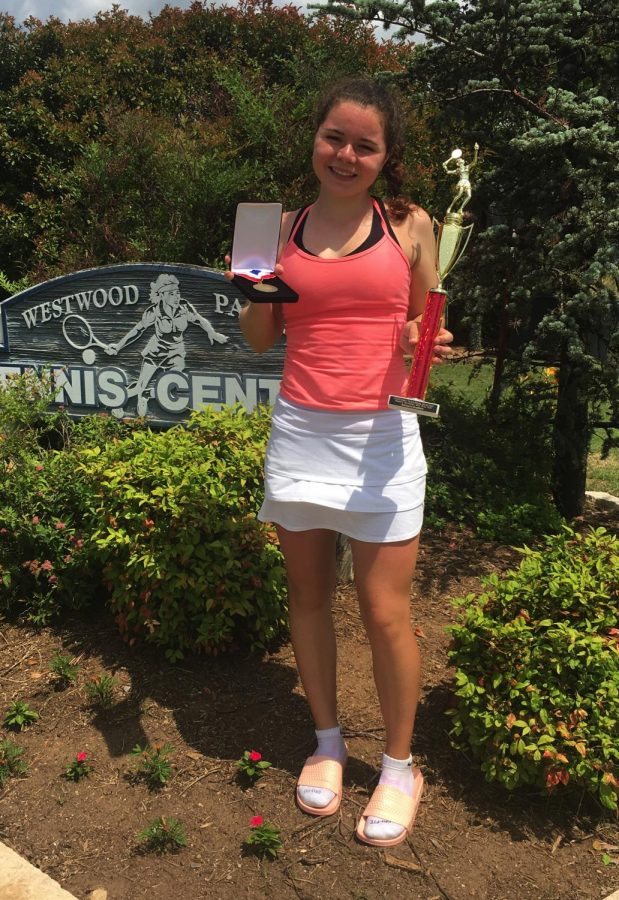The demanding schedule of two successful athletes
Insight to the lives of triathlete Andrew Flynn, and tennis player Alli Zipoli
In some ways, sophomores Andrew Flynn and Alli Zipoli are typical students.
They have demanding athletic and academic schedules, but they still find time to relax or hang out with their friends. On a day to day basis, they deal with issues we can all relate to—grades, homework, friend troubles, etc.
But when it comes to athletics, Flynn, a triathlete, and Zipoli, a tennis player, have had far from typical high school experiences. They have both achieved incredible success on some of the biggest platforms in their respective sports.
Flynn’s victory at the USA Triathlon Youth Elite Boys National Championships last summer is his greatest athletic accomplishment to date.
“I came into it as as the underdog, but I kept a positive mindset throughout the race and was able to break away and win,” said Flynn.
Zipoli’s superb play on the blue-chip tennis circuit demonstrates her athletic excellence. She is a five star recruit and plays in prestigious tournaments.
“I just came back from internationals—I was in Florida for a week and a half,”said Zipoli. Flynn and Zipoli are naturally talented, but other factors have been instrumental to their athletic successes.
In part, Flynn and Zipoli have been successful because of the support from their families. This support allowed both of them to begin competing at a young age.
Flynn began competing in triathlons when he was eight. His mom was on board from the beginning.
“I started to swim when I was around five or six and started to run with my mom when I was around six or seven,” said Flynn.
Zipoli began playing tennis when she was seven. The game is in her blood. “I started playing because my mom played tennis on a full ride at UNC, so it was kind of in our family,” said Zipoli.
Personal drive for athletic improvement is another important factor in their success.During the summer triathlon season, Flynn practices two triathlon parts every day. On Saturdays, he does all three. In the fall, he is on the school cross country team. During the winter, he competes for the school swimming team.
Zipoli takes early bird chemistry, which allows her to leave school at 2:00 P.M. every day.
She describes her training schedule as “fitness from 2:30 to 3:00 with my coach, hitting with my coach from 3:00 to 4:00, and then hitting with my mom and brother.”
These training regimes requires unique focus and dedication. To reach their current levels of athletic achievement, Flynn and Zipoli have had to forgo much of the free time enjoyed by most students.
However, Flynn and Zipoli are not training-obsessed sports robots. While they train hard, they also enjoy their free time.
“I spend a lot of time with my friends. My friend makes really good brownies so I like to go over and eat them,” said Zipoli.
Flynn also tries to get the most out of his limited free time. “I like to spend my free time with friends or just hang out and relax,” he said.
The business of Flynn and Zipoli’s schedules also means they have to walk a careful line when balancing athletics and academics.
Flynn made it clear that his (and Zipoli’s) daily priorities are a lot different from the average student.
“As a student-athlete, I always value academics over athletics, but I also try to find time for my athletics, since I value that so much,” said Flynn.
Zipoli missed 25 days of school last year. “I find [missing school] really easy. It’s just time management…doing stuff when you’re gone,”she said.
Both Flynn and Zipoli say they partly continue with their busy athletic schedules to improve their academic future.
Flynn said “I feel like I could go into college competing in athletics,” while Zipoli said her ultimate goal is “to play college tennis.”
Flynn and Zipoli are both less certain about competing after college.
“I don’t want to go pro because I want to have a normal life and a normal job,” said Zipoli. Flynn is more open to future competitions.
“I don’t know where triathalon will take me. I could become an Olympian, or maybe I just won’t continue with the sport. But I feel like I want to continue…then, I can decide what I want to do,” he said.







































